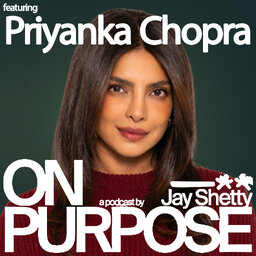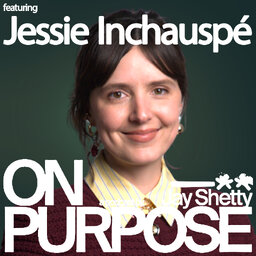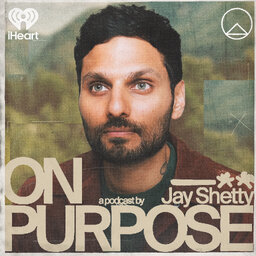Zane Lowe ON: 3 Tools for Navigating Social Anxiety & 3 Ways to Change Your Relationship with Your Ego
How do you deal with social anxiety?
Do you have tools in place to help you overcome anxious thoughts?
Today, Zane Lowe sits down with Jay Shetty for a conversation about success in career, marriage and parenthood, and how to navigate social anxiety. Zane is a grammy-nominated producer, executive, and radio host. He is Apple Music’s Creative Director and the flagship anchor for Apple Music 1, part of the award-winning Apple Music Radio. In addition to hosting his daily show, Zane curates original programming and oversees Apple Music's artist-led programming, which features shows hosted by Lady Gaga, Billie Eilish, Lil Wayne, Justin Bieber, and many more.
Zane opens up about his lifelong passion for music, which was ignited by a chance meeting with Split Enz. What's truly remarkable is that, despite his immense success in the music industry, He remains a devoted fan at heart. He reminds us that our passions can be a driving force in our lives, and when we put our focus on manifesting what truly matters, we can create space within ourselves for the good things.
As we dive deeper into this candid discussion, Zane shares his insights on maintaining a balanced life in the face of distractions and the importance of cherishing the simple things. He highlights the value of creating communities and experiences that inspire others, shedding light on how therapy played a pivotal role in preparing him for parenthood, and the essence of love as an unspoken language, the secrets of lasting marriages, and the true meaning of greatness.
In this interview, you'll learn:
Why you need to focus on what truly matters in your life
How to create space for positive things
The power of shared experiences in a community
How to love deeply and more meaningfully
How to be in-tune with your ego
How to maintain a healthy balance in your life
How to have impactful and inspiring conversations
In the end, we are reminded that the most inspiring conversations often happen with those who have no intention to sell, leaving us with profound insights about life and purpose.
With Love and Gratitude,
Jay Shetty
What We Discuss:
00:00 Intro
01:29 How A Life-long Passion For Music Evolved Into A Successful Career
07:36 We Manifest The Things We Focus On
10:06 Dedicate Your Focus To Things That Feel Authentic To You
14:19 The Importance Of Creating Space Within Your Mind
16:30 The True Purpose Of Music Is To Inspire and Create Community
20:55 How Therapy Helped Prepare Zane For Parenthood
24:55 What Kind Of Father Do You Want To Be?
26:30 Why Is Love Considered An Unspoken Language?
29:36 You Need To Grow Together If You Want Your Marriage Can Last
33:44 Navigating Social Anxiety
36:26 True Greatness Comes From Knowing How To Access It
42:06 How To Recognize A Genuine Connection With An Individual
45:37 What’s Your Relationship With Your Ego?
51:30 Do You Manifest? How Do You Practice Manifestation?
53:23 How Do You Manage Ambition And Still Maintain A Balanced Life?
58:46 You’ll Miss Opportunities If You’re Only Focused On Speed
01:01:00 Practicing Healthy Routines
01:04:07 Undoing Habits And Practices That Society Built For Us
01:11:03 What Is The Difference Between Working And Working Hard?
01:11:55 The Most Inspiring Conversations Are With People Who Have No Intention To Sell 01:17:25 Zane Lowe on Final Five
Episode Resources:
Zane Lowe | Twitter
Zane Lowe | Instagram
Zane Lowe | Facebook
Zane Lowe | TikTok
Zane Lowe | YouTube
In 1 playlist(s)
On Purpose with Jay Shetty
My name is Jay Shetty, and my purpose is to make wisdom go viral. I’m fortunate to have fascinating …Social links
Follow podcast
Recent clips

PRIYANKA CHOPRA JONAS: Fame, Motherhood, Love and the Moment That Changed Everything
1:49:49

Jessie Inchauspé: 90% of Pregnant People Are Missing THIS Nutrient (Follow THIS Simple Diet To Reduce Glucose Spikes & Protect Your Baby’s Brain & Metabolism)
1:12:12

Stop Trying to “Win” An Argument With Your Partner! (THIS Shift Will Turn Conflict into Communication)
38:35
 On Purpose with Jay Shetty
On Purpose with Jay Shetty